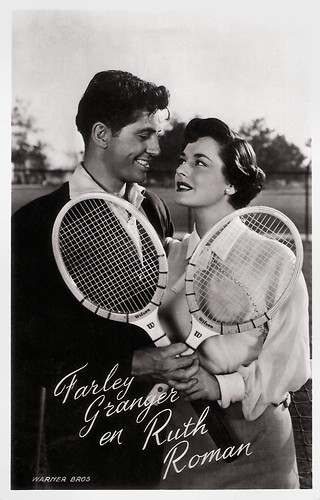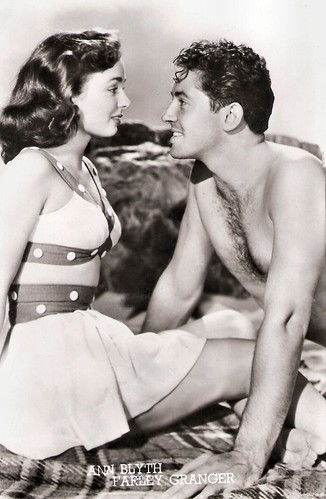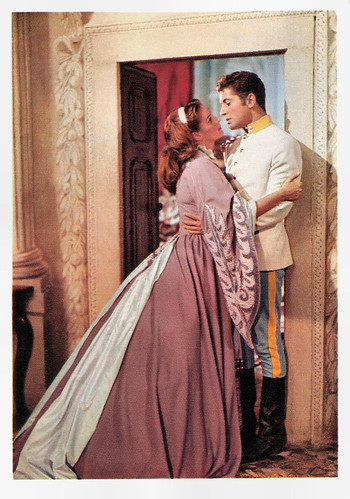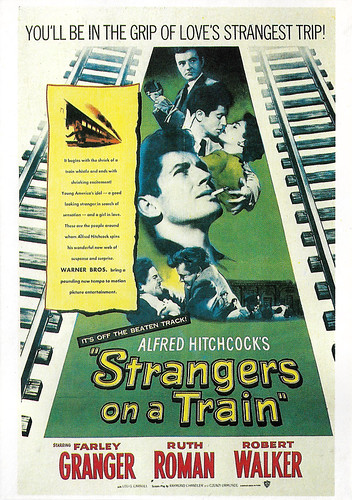American actor Farley Granger (1925–2011) is best remembered for his two films with Alfred Hitchcock, Rope (1948) and Strangers on a Train (1951). He also worked in Italy, most famously with Luchino Visconti on Senso (1954).

Italian postcard by Bromostampa, Milano, no. 7. Photo: Farley Granger in Senso (Luchino Visconti, 1954).

Dutch postcard by Takken, no. 566. Photo: Warner Bros. Farley Granger and Ruth Roman in Strangers on a Train (Alfred Hitchcock, 1951).

French postcard by Editions P.I., Paris, offered by Les Carbones Korès Carboplane, no. 683. Photo: United Artists. Publicity still for The Naked Street (Maxwell Shane, 1955).
Farley Earle Granger was born in San Jose, California in 1925. He was the son of Eva (née Hopkins) and Farley Earle Granger, a successful car dealer who was financially ruined after the crash of 1929. The family then moved to a small apartment in Los Angeles.
Granger was enrolled by his mother at Ethel Meglin's, the dance and drama instruction studio where Judy Garland and Shirley Temple had started. With his sensuous face, doe eyes, full lips, and jet-black hair, he was a dazzling handsome boy.
In his first small stage production, 'The Wookie', his good looks were noticed by talent agent Phil Gersh. He contacted Granger's parents and Farley got the small part of a teenage Russian boy in the Samuel Goldwyn production The North Star (Lewis Milestone, 1943) starring Dana Andrews. This propaganda film, written by Lillian Hellman, praised the Soviet Union at the height of the war. In the Cold War 1950s however, it would be condemned for its political bias.
Goldwyn signed the young actor to a seven-year contract for $100 per week. Next, he got a bigger role in another war film, The Purple Heart (Lewis Milestone, 1944) as a member of a bomber crew captured and tortured by the Japanese. Then Granger had to do naval service and landed in a unit in Honolulu that arranged troop entertainment in the Pacific. Here he made useful contacts with visiting entertainers like Bob Hope, Betty Grable and Hedy Lamarr, and also discovered his bisexuality.
After the war, director Nicholas Ray cast Granger in his debut feature, the Film Noir Thieves Like Us. He played the lead role of the emotionally unstable crook Bowie. The film was nearing completion in October 1947 when Howard Hughes acquired RKO Radio Pictures, and the new studio head shelved it for two years before releasing it under the title They Live by Night in a single theatre in London. Enthusiastic reviews led RKO to finally release the film in the States in late 1949. During the two years it had remained in limbo. The film had been screened numerous times in private screening rooms, and one of the people who saw it during this period was Alfred Hitchcock.

Publicity still by Goldwyn Production / RKO Radio Pictures. Farley Granger and Dana Andrews in Edge of Doom (Mark Robson, 1950).

Vintage postcard. Photo: Universal International. Farley Granger and Ann Blyth in Our Very Own (David Miller, 1950).

Belgian postcard, no. 1052. Photo: R.K.O. Shelley Winters and Farley Granger in Behave Yourself! (George Beck, 1951).
Alfred Hitchcock cast Farley Granger in Rope (1948), a fictionalised account of the Leopold and Loeb murder case. Granger and John Dall portrayed two highly intelligent friends who commit a thrill killing simply to prove they can get away with it. The two characters and their former professor, played by James Stewart, were supposed to be homosexual, and Granger and Dall discussed the subtext of their scenes, but because The Hays Office was keeping close tabs on the project, the final script was so discreet that scriptwriter Arthur Laurents remained uncertain of whether Stewart ever realized that his own character was homosexual.
Hitchcock shot the film in continuous, uninterrupted ten-minute takes, the amount of time a reel of Technicolor film lasted, and as a result technical problems frequently brought the action to a frustrating halt throughout the twenty-one-day shoot. Granger started a romantic relationship with Arthur Laurents that lasted about a year and their frequently tempestuous friendship extended for decades beyond their breakup. The film earned mixed reviews but much critical praise for Granger himself.
Hitchcock then cast him again in Strangers on a Train. He played the more conventional role of a handsome tennis champion, Guy Haines, mentally seduced by the unhinged Bruno (Robert Walker). Bruno obligingly murders the sportsman's wife, who is holding back Guy's career and social ambitions. When the killer wants repayment in kind – via the death of his own bullying father – matters go horribly wrong. This film also carried a sub-theme of homosexuality, although it was toned down from Patricia Highsmith's original novel.
Later, Granger described this as his happiest film-making experience, though he was deeply affected by his friend Walker's accidental drug death just before the film's release. Strangers on a Train (1951) proved to be a box office hit, the first major success of Granger's career. His subsequent projects included the war film I Want You (Mark Robson, 1951), the Gift of the Magi segment of the anthology film O. Henry's Full House (Henry King a.o., 1952 ), and the musical film Hans Christian Andersen (Charles Vidor, 1952), starring Danny Kaye. These were not so successful.

Spanish postcard. Farley Granger and Ruth Roman in Strangers on a Train (Alfred Hitchcock, 1951).

Spanish postcard. Farley Granger and Ruth Roman in Strangers on a Train (Alfred Hitchcock, 1951).

Dutch postcard, no. 552. Photo: RKO Radio Films.
Then Farley Granger accepted a role in Italy in Senso (1954), directed by Luchino Visconti. He was cast as the embittered romantic Franz Mahler, an Austrian lieutenant in occupied Venice just before the revolution that brought unification to Italy in 1871.
Franz betrays the married woman (Alida Valli) besotted with him. Her marriage, her title, and her country are nothing, as her post-coital eyes glow with a sexual intensity—Senso—that she feels for the first time. She in turn betrays not only her country, Italy, but also those struggling politically against the invading forces.
Richard Corliss in Time: “That was a great break for Granger, who got the role of his lifetime, and for the film — because Senso is the story of a strong woman ruined by her passion for a handsome, weak man, exactly the sort Granger had played before. This is a woman's picture, a domestic tragedy about the destructive effects of a lady's self-deception."
Filming in Italy lasted nine months, although Granger frequently was idle during this period, allowing him free time to explore Italy. He met Mike Todd, who cajoled him into making a cameo appearance as a gondolier in his epic Around the World in 80 Days (Michael Anderson, 1956).
At the 15th Venice International Film Festival, Visconti was nominated for the Golden Lion award for Senso. The film is now regarded as a masterpiece of Italian cinema.

Italian postcard by Rotocalco Dagnino, Torino. Photo: Lux Film. Alida Valli as countess Livia Serpieri and Farley Granger as Lt. Franz Mahler in Luchino Visconti's historical film Senso (1954).

Spanish postcard by Edicio Gambon, no. 95.

Small card.
Farley Granger returned to Hollywood where Darryl F. Zanuck offered him a two-picture deal. In quick succession, he made The Girl in the Red Velvet Swing (Richard Fleischer, 1955) with Joan Collins and Ray Milland, and the melodrama The Naked Street (Maxwell Shane, 1955), with Anthony Quinn and Anne Bancroft.
Then he went to work on Broadway, but his three productions there were unsuccessful. With both his film and theatrical career foundering, Granger turned to television. Later he would achieve some success on Broadway in 'The Seagull' (1964), 'The Crucible' (1965), 'The Glass Menagerie' (1965), and Ira Levin’s 'Deathtrap' (1978-1981).
In the early 1970s, Granger and his partner since 1963, Robert Calhoun moved to Rome. There he appeared in several Italian films, most notably the successful Spaghetti Western Lo chiamavano Trinità/They Call Me Trinity (E.B. Clucher aka Enzo Barboni, 1970), starring Terence Hill and Bud Spencer. He appeared with Yul Brynner and Dirk Bogarde in the French thriller Le Serpent/Night Flight from Moscow (Henri Verneuil, 1973). Granger co-starred with Giovanna Ralli and Mario Adorf in the slasher film La Polizia chiede aiuto/What Have They Done to Your Daughters? (Massimo Dallamano, 1974), a hybrid between Giallo and Poliziottesco.
Back in the US, he played in the slasher The Prowler (Joseph Zito, 1981) and in such soap operas as One Life to Live (1976-1977), and As the World Turns (1986-1987), for which Robert Calhoun was executive producer. In 1986 Granger won the Obie Award for his performance in the Lanford Wilson play 'Talley & Son'.
Later he appeared in several documentaries discussing Hollywood and Alfred Hitchcock, including The Celluloid Closet (Rob Epstein, Jeffrey Friedman, 1995), discussing the depiction of homosexuality in film and the use of subtext in various films, including his own. In 2003, Granger made his last film appearance in the documentary Broadway: The Golden Age, by the Legends Who Were There (Rick MacKay, 2003). In it, he tells the story of leaving Hollywood at the peak of his fame, buying out his contract from Samuel Goldwyn, and moving to Manhattan to work on the Broadway stage. In 2007, Granger published the memoir 'Include Me Out', co-written with Robert Calhoun. Farley Granger died of natural causes in 2011, at age 85. Calhoun had died in 2008.

British postcard in the Picturegoer Series, London, no. D 8. Photo: R.K.O. Radio.

French postcard in the Série Hitchcock by Editions ZREIK, Paris, no. H. Image: Warner Bros. American poster for Strangers on a Train (Alfred Hitchcock, 1951) with Farley Granger, Ruth Roman and Robert Walker.
Trailer for Strangers on a Train (1951). Source: warnervoduk (YouTube).
Sources: Richard Corliss (Time), Brian Baxter (The Guardian), Andre Soares (Alt Film Guide), Internet Broadway Database, Wikipedia and IMDb.
This post was last updated on 6 July 2024.

Italian postcard by Bromostampa, Milano, no. 7. Photo: Farley Granger in Senso (Luchino Visconti, 1954).

Dutch postcard by Takken, no. 566. Photo: Warner Bros. Farley Granger and Ruth Roman in Strangers on a Train (Alfred Hitchcock, 1951).

French postcard by Editions P.I., Paris, offered by Les Carbones Korès Carboplane, no. 683. Photo: United Artists. Publicity still for The Naked Street (Maxwell Shane, 1955).
Dazzling handsome
Farley Earle Granger was born in San Jose, California in 1925. He was the son of Eva (née Hopkins) and Farley Earle Granger, a successful car dealer who was financially ruined after the crash of 1929. The family then moved to a small apartment in Los Angeles.
Granger was enrolled by his mother at Ethel Meglin's, the dance and drama instruction studio where Judy Garland and Shirley Temple had started. With his sensuous face, doe eyes, full lips, and jet-black hair, he was a dazzling handsome boy.
In his first small stage production, 'The Wookie', his good looks were noticed by talent agent Phil Gersh. He contacted Granger's parents and Farley got the small part of a teenage Russian boy in the Samuel Goldwyn production The North Star (Lewis Milestone, 1943) starring Dana Andrews. This propaganda film, written by Lillian Hellman, praised the Soviet Union at the height of the war. In the Cold War 1950s however, it would be condemned for its political bias.
Goldwyn signed the young actor to a seven-year contract for $100 per week. Next, he got a bigger role in another war film, The Purple Heart (Lewis Milestone, 1944) as a member of a bomber crew captured and tortured by the Japanese. Then Granger had to do naval service and landed in a unit in Honolulu that arranged troop entertainment in the Pacific. Here he made useful contacts with visiting entertainers like Bob Hope, Betty Grable and Hedy Lamarr, and also discovered his bisexuality.
After the war, director Nicholas Ray cast Granger in his debut feature, the Film Noir Thieves Like Us. He played the lead role of the emotionally unstable crook Bowie. The film was nearing completion in October 1947 when Howard Hughes acquired RKO Radio Pictures, and the new studio head shelved it for two years before releasing it under the title They Live by Night in a single theatre in London. Enthusiastic reviews led RKO to finally release the film in the States in late 1949. During the two years it had remained in limbo. The film had been screened numerous times in private screening rooms, and one of the people who saw it during this period was Alfred Hitchcock.

Publicity still by Goldwyn Production / RKO Radio Pictures. Farley Granger and Dana Andrews in Edge of Doom (Mark Robson, 1950).

Vintage postcard. Photo: Universal International. Farley Granger and Ann Blyth in Our Very Own (David Miller, 1950).

Belgian postcard, no. 1052. Photo: R.K.O. Shelley Winters and Farley Granger in Behave Yourself! (George Beck, 1951).
Homosexual subtext
Alfred Hitchcock cast Farley Granger in Rope (1948), a fictionalised account of the Leopold and Loeb murder case. Granger and John Dall portrayed two highly intelligent friends who commit a thrill killing simply to prove they can get away with it. The two characters and their former professor, played by James Stewart, were supposed to be homosexual, and Granger and Dall discussed the subtext of their scenes, but because The Hays Office was keeping close tabs on the project, the final script was so discreet that scriptwriter Arthur Laurents remained uncertain of whether Stewart ever realized that his own character was homosexual.
Hitchcock shot the film in continuous, uninterrupted ten-minute takes, the amount of time a reel of Technicolor film lasted, and as a result technical problems frequently brought the action to a frustrating halt throughout the twenty-one-day shoot. Granger started a romantic relationship with Arthur Laurents that lasted about a year and their frequently tempestuous friendship extended for decades beyond their breakup. The film earned mixed reviews but much critical praise for Granger himself.
Hitchcock then cast him again in Strangers on a Train. He played the more conventional role of a handsome tennis champion, Guy Haines, mentally seduced by the unhinged Bruno (Robert Walker). Bruno obligingly murders the sportsman's wife, who is holding back Guy's career and social ambitions. When the killer wants repayment in kind – via the death of his own bullying father – matters go horribly wrong. This film also carried a sub-theme of homosexuality, although it was toned down from Patricia Highsmith's original novel.
Later, Granger described this as his happiest film-making experience, though he was deeply affected by his friend Walker's accidental drug death just before the film's release. Strangers on a Train (1951) proved to be a box office hit, the first major success of Granger's career. His subsequent projects included the war film I Want You (Mark Robson, 1951), the Gift of the Magi segment of the anthology film O. Henry's Full House (Henry King a.o., 1952 ), and the musical film Hans Christian Andersen (Charles Vidor, 1952), starring Danny Kaye. These were not so successful.

Spanish postcard. Farley Granger and Ruth Roman in Strangers on a Train (Alfred Hitchcock, 1951).

Spanish postcard. Farley Granger and Ruth Roman in Strangers on a Train (Alfred Hitchcock, 1951).

Dutch postcard, no. 552. Photo: RKO Radio Films.
Visconti
Then Farley Granger accepted a role in Italy in Senso (1954), directed by Luchino Visconti. He was cast as the embittered romantic Franz Mahler, an Austrian lieutenant in occupied Venice just before the revolution that brought unification to Italy in 1871.
Franz betrays the married woman (Alida Valli) besotted with him. Her marriage, her title, and her country are nothing, as her post-coital eyes glow with a sexual intensity—Senso—that she feels for the first time. She in turn betrays not only her country, Italy, but also those struggling politically against the invading forces.
Richard Corliss in Time: “That was a great break for Granger, who got the role of his lifetime, and for the film — because Senso is the story of a strong woman ruined by her passion for a handsome, weak man, exactly the sort Granger had played before. This is a woman's picture, a domestic tragedy about the destructive effects of a lady's self-deception."
Filming in Italy lasted nine months, although Granger frequently was idle during this period, allowing him free time to explore Italy. He met Mike Todd, who cajoled him into making a cameo appearance as a gondolier in his epic Around the World in 80 Days (Michael Anderson, 1956).
At the 15th Venice International Film Festival, Visconti was nominated for the Golden Lion award for Senso. The film is now regarded as a masterpiece of Italian cinema.

Italian postcard by Rotocalco Dagnino, Torino. Photo: Lux Film. Alida Valli as countess Livia Serpieri and Farley Granger as Lt. Franz Mahler in Luchino Visconti's historical film Senso (1954).

Spanish postcard by Edicio Gambon, no. 95.

Small card.
They Call Me Trinity
Farley Granger returned to Hollywood where Darryl F. Zanuck offered him a two-picture deal. In quick succession, he made The Girl in the Red Velvet Swing (Richard Fleischer, 1955) with Joan Collins and Ray Milland, and the melodrama The Naked Street (Maxwell Shane, 1955), with Anthony Quinn and Anne Bancroft.
Then he went to work on Broadway, but his three productions there were unsuccessful. With both his film and theatrical career foundering, Granger turned to television. Later he would achieve some success on Broadway in 'The Seagull' (1964), 'The Crucible' (1965), 'The Glass Menagerie' (1965), and Ira Levin’s 'Deathtrap' (1978-1981).
In the early 1970s, Granger and his partner since 1963, Robert Calhoun moved to Rome. There he appeared in several Italian films, most notably the successful Spaghetti Western Lo chiamavano Trinità/They Call Me Trinity (E.B. Clucher aka Enzo Barboni, 1970), starring Terence Hill and Bud Spencer. He appeared with Yul Brynner and Dirk Bogarde in the French thriller Le Serpent/Night Flight from Moscow (Henri Verneuil, 1973). Granger co-starred with Giovanna Ralli and Mario Adorf in the slasher film La Polizia chiede aiuto/What Have They Done to Your Daughters? (Massimo Dallamano, 1974), a hybrid between Giallo and Poliziottesco.
Back in the US, he played in the slasher The Prowler (Joseph Zito, 1981) and in such soap operas as One Life to Live (1976-1977), and As the World Turns (1986-1987), for which Robert Calhoun was executive producer. In 1986 Granger won the Obie Award for his performance in the Lanford Wilson play 'Talley & Son'.
Later he appeared in several documentaries discussing Hollywood and Alfred Hitchcock, including The Celluloid Closet (Rob Epstein, Jeffrey Friedman, 1995), discussing the depiction of homosexuality in film and the use of subtext in various films, including his own. In 2003, Granger made his last film appearance in the documentary Broadway: The Golden Age, by the Legends Who Were There (Rick MacKay, 2003). In it, he tells the story of leaving Hollywood at the peak of his fame, buying out his contract from Samuel Goldwyn, and moving to Manhattan to work on the Broadway stage. In 2007, Granger published the memoir 'Include Me Out', co-written with Robert Calhoun. Farley Granger died of natural causes in 2011, at age 85. Calhoun had died in 2008.

British postcard in the Picturegoer Series, London, no. D 8. Photo: R.K.O. Radio.

French postcard in the Série Hitchcock by Editions ZREIK, Paris, no. H. Image: Warner Bros. American poster for Strangers on a Train (Alfred Hitchcock, 1951) with Farley Granger, Ruth Roman and Robert Walker.
Trailer for Strangers on a Train (1951). Source: warnervoduk (YouTube).
Sources: Richard Corliss (Time), Brian Baxter (The Guardian), Andre Soares (Alt Film Guide), Internet Broadway Database, Wikipedia and IMDb.
This post was last updated on 6 July 2024.
No comments:
Post a Comment